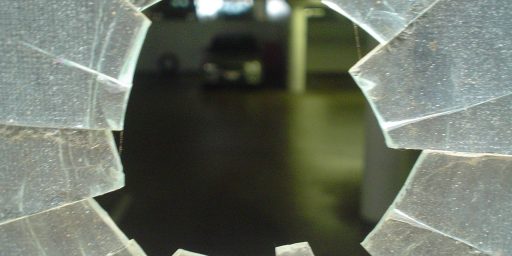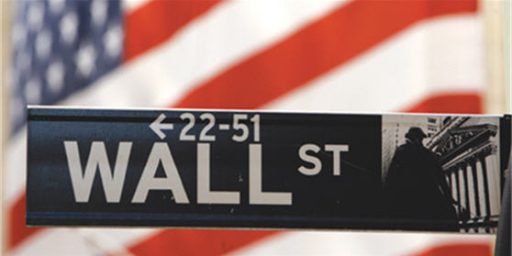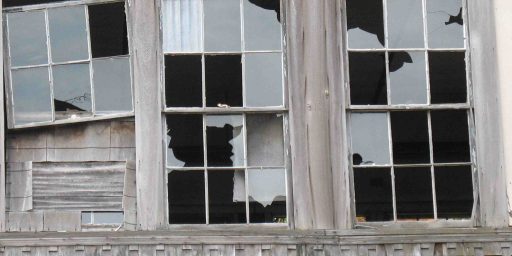Meditations on a Broken Window, Part 1.5 – A Clarification
Judging by the comments to my previous post, I think a lot of people didn’t understand what I was getting at, so let me try to simplify and clarify my point.
Bastiat’s point is that when a kid breaks a window that costs 6 francs to replace, that’s 6 francs that could have been spent doing something else, so it’s a net loss of 6 francs.
My point is that it’s a mistake to look at the broken window as a singular event. Since the invention of the window, windows have been broken, either through accident or malice. And stuff in general gets broken, whether through accident, malice, or normal wear and tear. And the entire economy has, baked into its assumptions and projections, the possibility that stuff breaks.
So, as I pointed out, because a kid breaking windows are expected, the price of the window reflects that windows break — they’re cheaper than they otherwise would be. And a competent shopkeeper is going to look for other ways to minimize that loss, whether it’s by budgeting overhead or paying insurance premiums. As a result, the net loss to the shopkeeper is going to be less than the 6 francs that represents the replacement cost.
So the bottom line is, it’s a mistake to look at the replacement cost of the window as a full loss, because in the aggregate, economic decisions are made based on the idea that windows get broken. So overall, the total loss is minimized.






No, that’s not even remotely close to Bastiat’s point. Bastiat’s point is that the loss, whether 6 francs or (“only”) 6-e francs, is borne by someone — the jacketmaker, the cobbler or some other unseen sufferer. And that policymakers therefore commit error when they fail to account for those sufferers.
And my point is that he’s mistaken to think that the loss is the full 6 francs. He’s not taking into account the fact that people make decisions based on the reality that stuff breaks. The loss ends up being de minimis.
lol, I like your new pic:)
Is it really that hard to understand that if none of our stuff broke we’d all be better off?
I had a favorite car, what if it just kept on going?
That money that went to repairs could have been spent on trips, or whatever. What happens “in aggregate ” to hide that loss? Hand-waving. That’s all.
I think the more important question is this: what cigar are you smoking in that picture of you?
Then you’d never buy a new car. Nor would anyone else. So there’d be a lot fewer auto workers, a lot fewer salvage yard workers, a lot fewer mechanics, a lot fewer car salesmen, etc etc etc.
We’re already dealing with the consequences of an economy with low aggregate demand — it produces high unemployment.
If memory serves, it’s a Camacho Corojo Maduro.
Jesus H. Christ….
No.
It is a zero-sum game, not a negative sum game.
OMFG…
Okay, so your argument is that breaking a window is, on a macro scale, going to occur. So, that this replacement process will result in regular work for the glaziers. Fine. Further, that this will result in lower prices. Again, fine.
HOWEVER! However, that is all reflected in Bastiat’s prices. You think this is something novel with the modern era? No. So the 6 francs reflects the lowered prices you are already talking about. Yeah, yeah I know he said suppose it costs 6 francs. But if he were alive today and teaching economics he might jsut as easily said, “Suppose the market is competitive and the price is P.” So, you have nothing new.
Zero.
Zip.
Nada.
A goose egg.
Really.
Now, if you argument is that depreciation results in lower prices over all since it creates demand where non-previously existed that is a debatable position, IMO. It depends on a host of factors and the conclusion is not theoretically clear cut. Consider that investment depends on savings. That is,
I = sY, where s is greater in the range [0,1], and most likely not at either extrema.
Net investment is,
DK = sY – dk,
where DK is the change in capital and d is the depreciation rate. More capital investment means lower consumption today. Does that mean lower or higher prices for consumption goods today? Demand has dropped, but more resources are going into investment. Presumably we will increase investment today if we value the additional consumption in the future. Of course, all this is from the plain old vanilla Solow-type growth model which has been found to be lacking overall.
Still lets keep going. Suppose we augment the above net investment equation with,
DK = sY – dK + e,
Where e is a random variable that is either 0 with a probability very close to 1 or a very large negative number with a very small probability. In this case, when the bad state occurs for investment to be positive you have to give up considerable current consumption, or you have to suffer a substantial hit to your accumulated capital and with that lower consumption in the future.
Using this model, there is almost no way for the earthquake/tsunami disaster to be a good thing. Even if we allow for model refinements like what has been seen with endogenous growth models I still don’t see how an earthquake could result in a good outcome.
TL:DR–you have made an error in assuming that the very process you are explicating didn’t exist in Bastiat’s example. However, given that he is describing the effects of a broken window on functioning economy this claim is dubious.
I would not buy another car Alex, but I’d probably buy a boat. Or a vacation.
As Steve says, OMFG.
BTW, if the reduction in “wear” ultimately led to an increase in “leisure,” would you oppose it?
This might be a thing beneath the Bastiat mis-interpretation. “Industry” is a fine remedy for poverty, but isn’t quite as good as leisure, when you get right down to it.
again:
If breaking stuff is a good idea, why don’t we bomb our own cities?
Nothing in today’s post addresses this idea, so you are still missing a crucial bit of the argument. Stever Verdon and John Personna both are trying to help.
Alex, thanks for staying with this. Economics only *appears* to be simple; getting it right is hard for all of us.
Alex –
Put out the gd cigar, please. Or at least no scotch and cigar at the same time. (Courtesy of an oral surgeon friend of mine.)
I think people “got it.” They just don’y buy it. Steve has made the point formally. Others, sarcastically. The economy can’t be lead by breaking stuff. And everyone knows stuff wears out…….
I think you’re main hypothesis was:
I think you’ve failed to prove that. But let’s say it was true:
Would it be net beneficial to open a store in an area where–all other things equal–kids far more frequently break windows? I don’t see how. The windows may be “cheaper”, but you (and other business owners who might buy from you) probably pay insurance, and you probably lose customers while windows are waiting to be repaired.